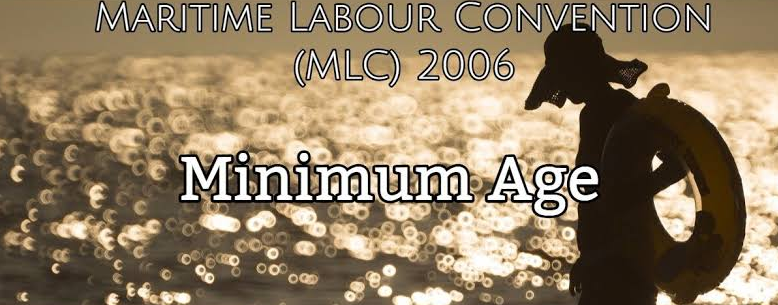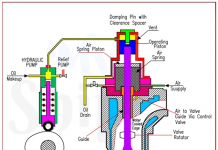
Title 1. Minimum requirements for seafarers to work on a ship
Regulation 1.1 – Minimum age
Regulation 1.2 – Medical certificate
Regulation 1.3 – Training and qualifications
Regulation 1.4 – Recruitment and placement
Regulation 1.1 – Minimum age
1. The employment or work on board a ship of any person under the age of 16 shall be prohibited.
2. Night work of seafarers under the age of 18 shall be forbidden. For the use of this Standard, “night” shall be defined in accordance with national law and practice. It shall include a period of at least nine hours starting no later than midnight & ending no earlier than 5 a.m.
3. An exception to strict agreement with the night work restriction may be made by the competent authority when:
(a) the successful training of the seafarers concerned, in accordance with established programmes and schedules, would be impaired; or
(b) the particular nature of the duty or the certified training programme needs that the seafarers covered by the exception perform duties at night and the authority determines, after discussion with the shipowners & seafarers organizations concerned, that the work will not be detrimental to their health or well-being.
4. The employment or work of seafarers under the age of 18 shall be forbidden where the work is likely to jeopardize their health or safety.The types of such work will be decided by national laws or by the authorized authority, after consultation with the shipowners’ and seafarers’ organizations concerned, in accordance with relevant international standards.
Regulation 1.2 – Medical certificate
1. The authorized authority will require that, before beginning work on a ship, seafarers hold a valid medical certificate attesting that they are medically fit to perform the duties they are to carry out at sea.
2. The medical certificate shall be issued by a duly qualified medical practitioner.
3. Seafarers that has been rejected a certificate or have had a limitation on their ability to work, in particular with respect to time, field of work or trading area, shall be given the chance to have a further examination by another independent medical practitioner or by an independent medical referee.
(a) a medical certificate will be valid for a maximum period of two years unless the seafarer is under the age of 18, in which case the maximum period of validity shall be one year;
(b) a certification of color vision will be valid for a maximum period of six years.
4. In urgent cases the competent authority may permit a seafarer to work without a valid medical certificate until the next port of call where the seafarer can get a medical certificate from the competent medical practitioner, provided that:
(a) the duration of such permission does not exceed three months; and
(b) the concerned seafarer is in hold of an expired medical certificate of recent date.
5. If the period of validity of a certificate expires in the course of a voyage, the certificate shall continue in force until the next port of call where the seafarer can get a medical certificate from a qualified medical practitioner, provided that the period shall not exceed three months.
6. The medical certificates for seafarers working on ships ordinarily engaged on international voyages must as a minimum be provided in English.
Regulation 1.3 – Training and qualifications
Purpose: To ensure that seafarers are trained or competent to carry out their duties on board ship
1. Seafarers will not work on the ship unless they are trained or certified as competent or otherwise qualified to perform their duties.
2. Seafarers will not be allowed to work on the ship unless they have successfully completed training for personal safety on board ship.
3. Training & certification in agreement with the compulsory instruments approved by the International Maritime Organization shall be considered as meeting the requirements of paragraphs 1 and 2 of this Regulation.
4. Any Member who are, at the time of its ratification of this Convention, was bound by the Certification of Able Seamen Convention, 1946 (No. 74), shall continue to carry out the obligations under that Convention unless and until mandatory provisions covering its subject matter have been adopted by the International Maritime Organization and entered into force, or until five years have passed since the entry into force of this Convention in accordance with paragraph 3 of Article VIII, whichever date is earlier.
Regulation 1.4 – Recruitment and placement
All seafarers will have access to an efficient, adequate & accountable system for finding employment on board ship without charge to the seafarer.
1. Each Member that runs a public seafarer recruitment and placement service shall ensure that the service is operated in an orderly manner that protects and promotes seafarers’ employment rights.
2. Where a Member has private seafarer recruitment and placement services operating in its territory, they shall be operated only in conformity with a standardized system of licensing or certification or other form of regulation.
In such case, a Member shall adopt, in its laws and regulations or other measures, at a minimum:
(a) Forbids seafarer recruitment & placement services from using means, mechanisms or lists intended to prevent or deter seafarers from gaining employment for which they are qualified;
(b) Required that no fees or charges for seafarer recruitment or for providing employment to seafarers are borne directly or indirectly, in whole or in part, by the seafarer, other than the cost of the seafarer obtaining a national permitted medical certificate, the national seafarer’s book and a passport or other similar personal travel documents.
(c) ensure that seafarer recruitment and placement services operating in its territory: maintain an up-to-date register of all seafarers recruited or placed through them, to be available for inspection by the competent authority;




